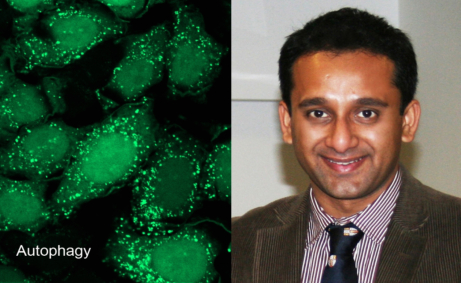
Dr Sovan Sarkar wins UK Biochemical Society award.
A Gates alumnus has been given a prestigious award for his outstanding research which could pave the way for new treatments for a range of diseases.
Dr Sovan Sarkar (2002-2005), a research scientist at the Whitehead Institute for Biomedical Research in Massachusetts Institute of Technology, is one of just four winners of the 2012 UK Biochemical Society Early Career Research Award.
The award is given for outstanding research carried out by an early career scientist and relates to Dr Sarkar’s work at the University of Cambridge. This focuses on understanding the mechanisms behind a cellular protein degradation pathway called autophagy, which has been implicated in many human physiological and pathological conditions, including development, immunity, cancer, neurodegenerative diseases, liver diseases and longevity.
Dr Sarkar says: “My work has generated a vast resource of small molecules regulating autophagy that has been widely employed by many research groups worldwide to show beneficial effects in transgenic animal models of diseases, ranging from a number of neurodegenerative diseases, liver diseases to infectious diseases, where autophagy acts as a protective pathway. This has provided important mechanistic insights into the regulation of mTOR-independent autophagy and has led to the discovery of a number of candidate drugs of potential biomedical relevance.”
The award recognises the impact of research carried out by scientists who have been awarded their PhD within the last five years. The Society says: “It is expected that successful candidates will have produced international quality research outputs, and be able to demonstrate ambitions and aspirations consistent with the potential to achieve world-leading status.”
Dr Sarkar completed his PhD in Medical Genetics from Cambridge Institute for Medical Research in 2006. He was a student at Hughes Hall and later a Research Fellow at the College. The Times of India has reported on his success.












